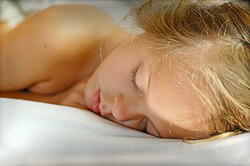
Back Slaap Afrikaans نوم Arabic نعاس ARY نوم ARZ Ikiña Aymara Yuxu (fizioloji proses) Azerbaijani یوخو AZB Sirep BAN Turog BCL Сон Byelorussian

Sleep is a state of resting, which happens in animals, including humans. During deep sleep, most of the muscles that animals can otherwise control are not active, but regain the energy for the next time they wake up. Animals during sleep are usually in an unconscious, relaxed state. Like most animals, healthy sleep in humans takes place at night.[1]
Asleep describes the condition where animals are in the process of sleeping. During this time, they will not react as quickly (if at all) as they would if they were awake. They can, however, wake up from sleep more easily than from hibernation or coma. All mammals, birds, many reptiles, amphibians and fish have a sleep cycle. In humans, other mammals, and most other animals that were studied, regular sleep is essential for survival.
It seems that all animals with complex brains have sleep. We know that sleep is extremely important to human health and well-being. Humans and animals need sleep in order for their bodies to be prepared for the next day. Everyday activities, one’s appearance, and how one expresses oneself all rely on this necessity.[2] If one is tired (from not getting enough sleep), one will not be able to function properly in common activities. Being sleep-deprived leads to struggling to remember information, altering one’s mood, energy, health, focus and a number of other effects.[3] Sleep deprivation (not allowing a person enough sleep) can even be used as torture.[2][4]Sleep deprivation causes negative effects for the person such as: irritability, memory lapses or loss, and some aches in different areas of the body. Although you feel that you may have extra time while not sleeping well, it has a negative reflection on your body, and on meals, which you can't taste as before.[5][6] Also, the immune system normally releases compounds known as cytokines which are used to help fight inflammation and infection. If a person does not receive enough sleep, they will not have enough cytokines to protect them from getting sick.[7] The body may not have time to complete memory recollection, muscle repair, and release hormones that regulate growth and appetite.[2]
During daytime, the sun is out, and most people are awake. They work, go to school, or complete daily errands and activities. Many people sleep for a short time in the early afternoon for a quick rest—or because they are not able to sleep during the day.[8] This is called a nap. A successful nap should run between 15 and 30 minutes, and longer naps taking 30–60 minutes will result in feeling dazed and less attentive.[9]
In some countries, most notably where the weather is warm, there is a tradition to take a nap right afternoon, or early in the afternoon. This tradition is called siesta, and it is most common in Spain and Latin America. Some stores and services close while their owners and/or employees take their siesta.
Most of what is said above applies widely in the animal kingdom. However, some primitive animals do not appear to sleep, or more correctly, sleep has never been shown. Rather more important is that some animals sleep as we do, at night, but some sleep during the day, and are active at night. This is called being nocturnal. Mammals spent much of their early evolution sleeping during the day and being active at night. They were there, but the dinosaurs ruled the daytime during that age.
- ↑ Macmillan dictionary for students Macmillan, Pan. 1981, page 936. Retrieved 2009-10-1.
- ↑ 2.0 2.1 2.2 "What Happens When You Sleep? - National Sleep Foundation". www.sleepfoundation.org. 22 December 2009. Retrieved 2019-03-25.
- ↑ "Sleep optimization: the cost of sleep deficit". sustainabilitist.com. Retrieved 2021-09-27.
- ↑ "The Effects of Sleep Deprivation". www.hopkinsmedicine.org. Retrieved 2019-03-25.
- ↑ "Sleep Optimization | The Sustainabilitist". 2021-01-16. Retrieved 2023-02-10.
- ↑ "Sleep Optimization | The Sustainabilitist". 2021-01-16. Retrieved 2023-02-08.
- ↑ "The Science of Sleep: why you need 7 to 8 hours a night". Healthline. 2013-05-06. Archived from the original on 2019-03-25. Retrieved 2019-03-25.
- ↑ Bun Bun 2 (2017-10-09), Why do people take naps?, retrieved 2019-03-25
{{citation}}: CS1 maint: numeric names: authors list (link) - ↑ "What is the ideal nap length". Sleep.org. Retrieved 2019-03-25.
© MMXXIII Rich X Search. We shall prevail. All rights reserved. Rich X Search